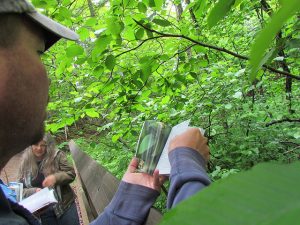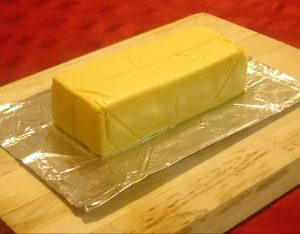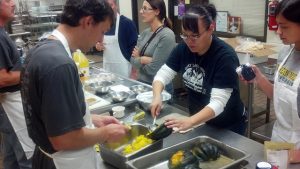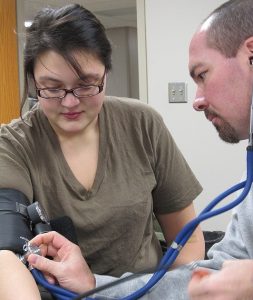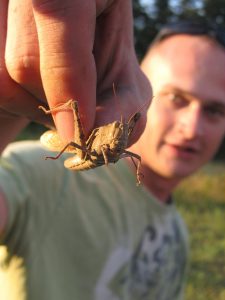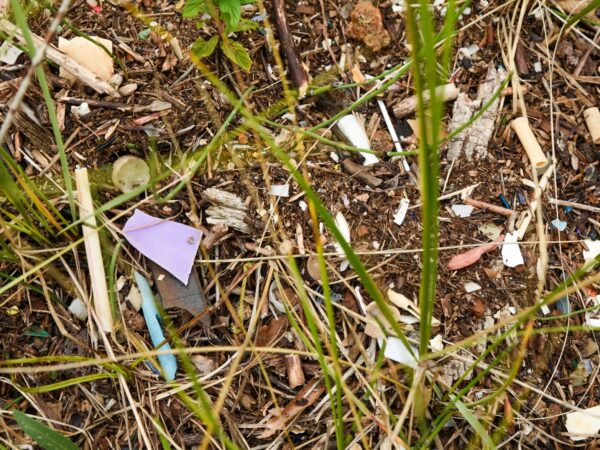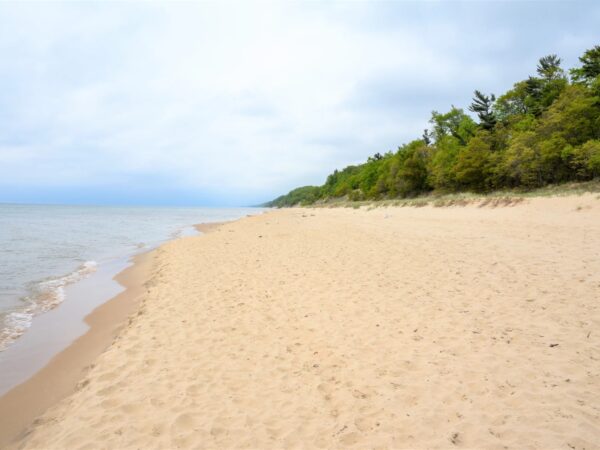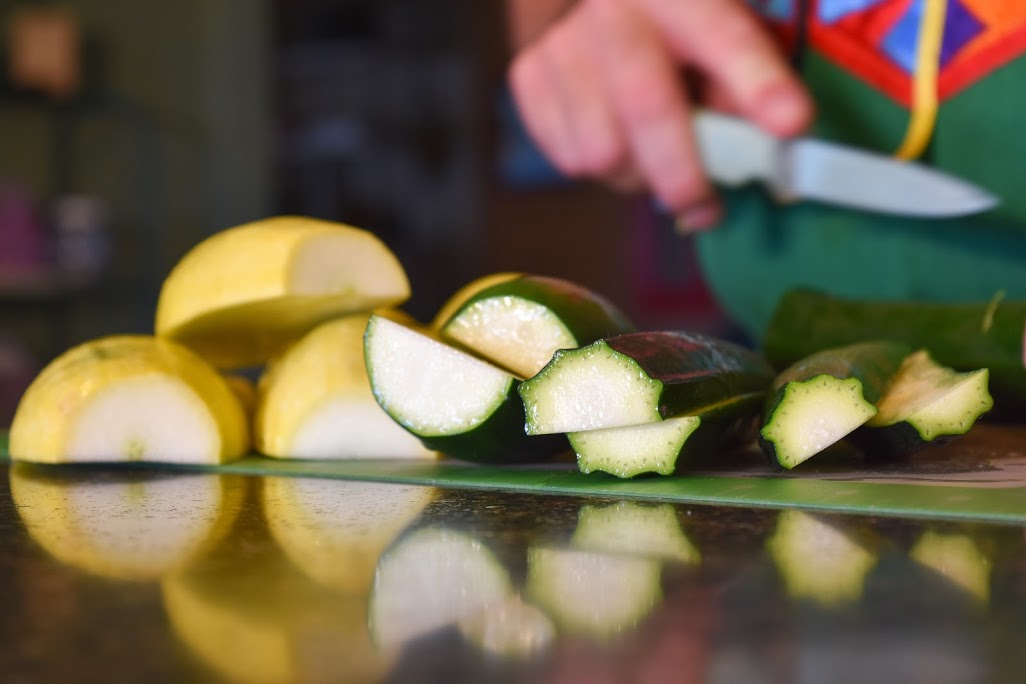
If you’re a nature lover, and you take a walk in the woods or near the shore, you probably enjoy identifying the flora and fauna you see.
When Dr. Martin Reinhardt takes a walk among the plants and flowers, he sees DINNER.
And he imagines meals the way they used to be for Native Americans who lived along the Great Lakes centuries ago.
Dr. Reinhardt is an Anishinaabe Ojibway citizen of the Sault Ste. Marie Tribe of Chippewa Indians from Michigan. He is – among many other things – an assistant professor of Native American Studies at Northern Michigan University in Marquette.
He has been monitoring the health of Native Americans who live in the Great Lakes Region for many years. And he has known something is terribly wrong for some time.
Obesity. High Cholesterol. High blood pressure. Addiction to cigarettes, drugs and alcohol.
The Centers for Disease Control says Native American adults are twice as likely to be diagnosed with diabetes than the general population, and that the suicide rate among Native Americans in the U.S. is more prevalent than in any other racial or ethnic group in the U.S.
Many of the illnesses Reinhardt saw in his people were caused by problems created by bad nutrition, often due to lack of availability of healthy foods.
But Reinhardt also wondered if some of the issues were caused by a separation from a culture that was taken away from them.
Reinhardt says when Native Americans were forced onto reservations, they stopped eating fresh vegetables, wild rice, game and fish. Government commodities replaced the organic, nutrient-rich foods that had been part of their lives for hundreds of years.
Reinhardt tells Great Lakes Now he was raised on processed food and he remembers eating cheese that was bright orange in color. He says most of the families he knew ate the same kind of food.
He wondered if he might be able to have a positive effect on Native Americans and others by changing their relationship to food.
He decided to try an experiment.
In March of 2012, he and 25 people in the Marquette area agreed they would eat only foods that grew in the Great Lakes region three hundred years ago, before Europeans came to the Americas. The research project titled “The Decolonizing Diet” (DDP) was carried out through Northern Michigan University.
The group ate cranberries, wild rice, fish, venison, maple syrup and other locally sourced foods, and started recreating teas and other products made from roots and herbs Reinhardt’s ancestors once gathered along the shores of the Great Lakes and deep in the forests.
They were allowed to choose one non-locally sourced item they felt they couldn’t live without (most chose coffee.)
Many of the participants hunted and fished for the first time. Some of them became involved in wild rice harvesting projects. Others who had never gardened before started planting seeds in the soil.
For some, it was their first experience tasting ferns and lichens. They even went a step further and had up-close-and-personal experiences with squirrel and possum.
They learned to make flour out of nuts, corn and other produce.
They started shopping at farmer’s markets and using co-ops more than they ever had before.
Local grocery stores in the Marquette area started taking part, and even put special “DDP” labels on their foods so participants would know which products fit in to the program.
The group tried this experiment for one year, and got physicals and check-ups on a regular basis as well as at the beginning and end of the trial. The information was analyzed the following year.
Dr. Reinhardt says the results were astounding. He says the health of every participant improved.
Based on statistical analysis of group data, Dr. Reinhardt says the research subjects experienced significant reductions in weight, girth and body mass, as well as reductions in blood pressure, cholesterol, and blood glucose levels.
But he and many of the research subjects said what was just as stunning were the social and cultural benefits that came from the project.
Some of them quit smoking and drinking, too.
They organized dinners, shared recipes, collected food together and even started holding cook-offs. They taught each other traditions passed on from their ancestors, and shared their gardening, hunting and fishing skills.
They created large followings on social media.
There was even a DDP romance and a DDP baby.
April Lindala was one of the research subjects.
She says participating in the Decolonizing Diet Project (DDP) changed her life. She tells Great Lakes Now, “this was truly a transformative year for me. I came to deeply understand the relationship I have with the food I consume. We are interconnected.”
Lindala wound up harvesting a doe, tanning the hide and learning traditional ways of smoking meat. She says, “The DDP and related activities are acts of cultural continuance in honor of the teachings of the Anishinaabeg. We employed the same lessons that the Anishinaabe elders of these homelands and their elders before them employed to live, to survive, and to thrive.”
Nancy Irish, another DDP research participant, lost ten pounds in the first month because she says, “At first, I didn’t know what to eat!”
She says she ate her first baked grasshopper following a DDP group grasshopper roundup in a meadow on her family’s land. (She tells Great Lakes Now she hopes she will never be hungry enough to need to rely on grasshopper protein, but she says she’s glad to know she could!)
Irish wanted to participate in the DDP because she says it “integrated her keenest interests and passions: nutrition and the ecology of the food system, being in and learning from the natural world, and building bridges between cultures.” As a non-Indian participant, Irish says, “ The greatest gift of the year was simply the gradual process of becoming more familiar with one another, for sturdy bridges, like trust, cannot be built between strangers.”
Irish adds, “The DDP year was among the most valuable and enjoyable experiences of my life.”
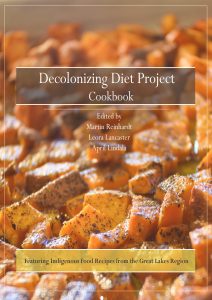
Decolonizing Diet Cookbook, courtesy of Decolonizing Diet Project
April Lindala wound up helping Dr. Reinhardt write a cookbook called “The Decolonizing Diet Project Cookbook.”
All of the ingredients in the recipes in the cookbook either existed in the Great Lakes Region naturally, or were brought by Indigenous peoples to the Region prior to 1600.
When the year of eating indigenous food grown in the Great Lakes was over, many of the people who participated in the study continued consuming locally sourced food.
DDP Cook-offs are still held on the Northern Michigan University campus, and many of the research subjects still get together for potlucks and to compare notes on how to obtain and grow food their ancestors once ate.
Dr. Reinhardt tells Great Lakes Now, “Ultimately, the DDP provides us with research-based evidence that a diet based in Indigenous foods can have significant positive impacts on our overall health. It gives us something to build on for future studies and programs. For instance, we may conduct a gut microbiome study soon based on the outcomes of the DDP. It also helped us to discern multiple needs at the community level. One need is for greater availability of Indigenous foods within local food markets at lower costs. Another is for more educational opportunities focused on Indigenous foods identification and accessing it through gardening, foraging, hunting, or fishing.”
Why not try eating food from the Great Lakes Region for your Thanksgiving feast? (see recipes below). Venison Roasted with Cranberries. Wild Blueberry Pudding. Baked Turkey with Corn Gravy. And Maple Sugar Coated pecans.
If nothing else, think about the origin of the food you devour over the holidays and consider adding a few items to the table that existed in the Great Lakes Region hundreds of years ago.
And remember a time when food not only nourished you but connected you to a special place.
(for more information on the Decolonizing Diet Project, go to Decolonizing Diet Project Blog.)
3 Comments
-
How can I order one of these cookbooks?
-
Northern Michigan University Official Bookstore
Login/Sign up | Faculty Resources | Blog
-
-
While you’re decolonizing, I hope it dawns on you to use baskets and cloth bags, bc plastic is killing us and destroying our environment. Cheesecloth, flour bags (and when needed wax sealed cloth) contains dry food beautifully. Stainless steel not only lasts, but it doesn’t interfere with food taste and there is no danger of leaching.


